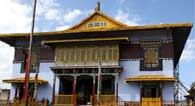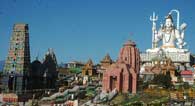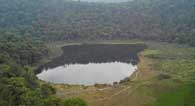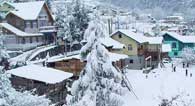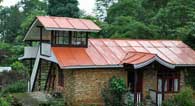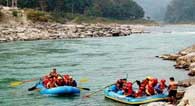CONTACT US
Church Road, Near Pelling Taxi stand, Gangtok-737101, Sikkim, India
Phone no.
+91-9832564013, 03592-206888, 9002069916, 9933448360.
Email : sikkim444@gmail.com
Darjeeling Tea
Darjeeling produces world famous Darjeeling teas, which has been fancied by the Connoisseur world over. As the tea plantation was started in 1847 by Dr Campbell planting the Chinese species. Labours were recruited from Nepal to work on the plantations nurseries of tea seeds which were established in Lebong. Darjeeling manufactures Orthodox variety of tea.
While in the process of manufacture, green leaves plucked from garden containing about 80% of moisture is laid in a dryer box which is known as -Withering. After withering, when the leaves have become soft, is subjected to the second stage of manufacture called Rolling. Here the Rolling Machines rolls and press the withered leaves without breaking or cutting them while only breaking the cells within enabling the juice from inside to be pressed out and aminate on the outside surface. Normally two rolls after every 40 minutes are given by varying pressures to press the juice out. In between the rolls, the leaves are subjected to sifting in which the sifting machine separates the coarse from fine. The rolled leaves are now covered in juice and chemical constituents are subjected to the third stage of process called-Fermentation, where they are kept very thinly spread on clean and impervious trays or racks in a high humidity room. Here the leaves start developing aroma, flavour and other qualities by bio-chemical reactions. After fermentation, leaves are dried under fire to check further fermentation. Over fermentation and under fermentation is harmful to the development of proper character in tea. While in the process of drying leaves are spread on the trays in the chamber of drying machines where the dry heat with the extension of temperatures of 240F to 250 F are passed. The tea which is ready after these manufacturing processes contains only about 2% to 3% moisture contents. Nowadays, many forms of teas are manufactured where some of them are known as Bio-Organic, Clonal, White tea, Green tea, etc., which needs more expertise. Last process is known as-Sorting where grading is done on the basis of Full Leaf and Broken Leaf. Full Leaf grade is known Golden Flowery Orange Pekoe, while the Broken Leaf Grade is known as Golden Broken Orange Pekoe.
Darjeeling teas are exported to many countries where today U.K, Japan and Germany are the major importers.
Darjeeling teas are categorised according to flushes where First Flush and Second Flush have higher prices which consist of only about 25% to 30% of total annual production. Teas manufactured during rainy season are in bulk quantities.
The flavour of Darjeeling tea as it is said is very much influenced by external conditions as well, like the elevation and soil conditions on which the bushes are grown, the weather conditions on which the leaves are plucked and the shift of workers handling the manufacturing process.
Experimental Success of Darjeeling Tea: Story of Darjeeling Tea is that when Dr. Campbell, also British surgeon, experimented with tea seeds in his garden at Beechwood in Darjeeling at an altitude of 2,134 metres. He was reasonably successful in raising the plant following which British Government elected to put up tea nurseries in this area in 1847.
According to records, first commercial tea gardens planted by British tea interests were, Tukvar, Steinthal and Allobari Tea Estates. By 1866 Darjeeling had some 39 gardens producing a total of 21,000 kgs of tea. In 1870, the number of gardens increased to 56 that produced 71,600 kg teas harvested from 4400 hectares of land. During 1860-64, the Darjeeling tea company was established with four gardens, while Da5rjeeling Consolidated Tea Company was established on 1896. It is said that by 1874 tea business in Darjeeling was a profitable venture with 113 gardens covering the approximate area of 6,000 hectares of land.
At present there are 86 tea gardens producing pure Darjeeling tea on a total of 19,000 hectares of land. Apart from tourism, tea is the biggest industrial activity in Darjeeling.
However these days, package tours to tea gardens are available to fill the trip with romantic adventure and knowledge in relation to Tea Culture and village activities. Imagine sitting in a bungalow that is surrounded by vast expanse of tea plantations. The scenic beauty of Darjeeling has a subtle ambience - a mental and sensory quietude - rarely to be experienced elsewhere. Or one could opt to go for camping for overnight along the river side, where one could spoil oneself by enjoying timeless relaxation or endless hours of leisure by listening to the music of the wind and sleep down to the sound of the moon and the entire cosmos. One can still go for fishing at night and come to enjoy the barbecue feast along the pure white sands of the pristine waters of river. An ideal romantic trip for honeymooners.





